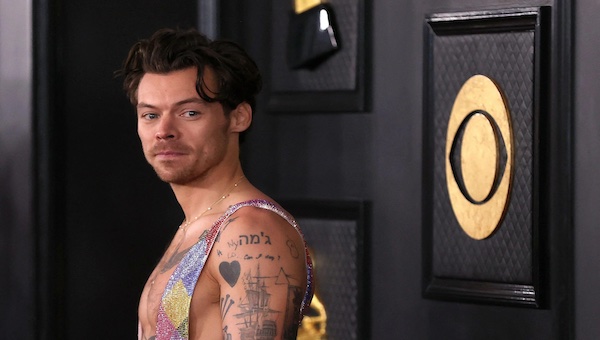
HARRY STYLES AT THE GRAMMYS [ALAMY]
WHY GEN Z IS TURNING AGAINST WOKE CULTURE
BY: PANDA LA TERRIEREORIGINAL SITE: SPECTATOR
TOPICS
Activism
AI
Belief
Big Pharma
Conspiracy
Cult
Culture
Economy
Education
Entertainment
Environment
Faith
Global
Government
Health
Hi Tech
Leadership
Politics
Prophecy
Science
Security
Social Climate
Universe
War
The other day, in a bar in London frequented by students of the infamously ‘woke’ Goldsmiths University, I met a young white cis-male who said that the English were to blame for his inherited trauma because of their historic oppression of the Irish. The only problem was, he wasn’t Irish – he was American and so were his parents and probably grandparents. ‘Pain lasts a long time,’ he assured me.
What struck me about this encounter was not that it was typical of my Gen Z generation but that it was so obviously cringe-inducing – a sort of hackneyed pick-up line. Another student at the same bar – sporting an orange mullet and a thong as a T-shirt – tried to convince me my age was a social construct.
To me and many of my Gen Z peers, who were born after 1996, such talk feels increasingly silly: a millennial trend that’s got old and tired. The absurdity has become too glaring. If being distantly related to the Irish can engender self-compassion, could not my white Englishness be reframed as a form of victimhood? How can there be an end to oppression when the opportunities to be oppressed are so endless?
We feel as if we’ve run into a mental wall, and the whole woke business is running out of road. ‘Intersectionality’ – the academic word for the game of victimhood top-trumps which has dominated our discourse for so long – seems to have metastasised so much it makes no sense to anyone. New neurodiversities, new genders, new sexual orientations, new disadvantages are spawned every day.
At university we were scared of committing cultural appropriation, of forgetting to wear our (she/him) stickers, of missing trigger warnings and contaminating safe-spaces. We were scared of each other
Actual poverty, the original disadvantage, is rejected at the victim-card vending machine. Take millennial singer Harry Styles, who is known to wave a Pride flag at almost every one of his concerts. Accepting his Album of the Year award at the Grammys last week, he said: ‘This doesn’t happen to people like me very often.’ He was right. Boys from the Midlands who grow up working class in single-parent households rarely reach the heights of fame and success that Styles has. But Styles had forgotten that, no matter how androgynously he dresses, he is still white and a man and pale males aren’t meant to talk about overcoming odds. Some of his fans, as Vogue put it, ‘can’t quite believe anybody who looks like Styles, any homogenous white guy, has the audacity to publicly signal a lack of privilege’.
Clearly, Styles should have studied more. To be specific, he needed to be incubated in a campus environment with an obscene amount of free time and no desperate imperative to make money from around 2017 onwards. This is where the millennial and Gen Z respective commitment to ‘woke’ diverges. Millennials spoke out about race, feminism, sex, consent and so on. The cohort that succeeded didn’t reject their ideas, but they picked up the baton and ran with it in a million different directions. Gen Z has so complicated and corrupted the theories it inherited that none of us can even begin to understand any more.
Our university careers were spent in a state of intermittent abject terror. We were scared of committing cultural appropriation, of forgetting to wear our (she/him) stickers, of missing trigger warnings and contaminating safe-spaces. We were scared of each other.
Millennials, such as Styles (and the other Harry, HRH, for that matter), were able to popularise and profit from woke. We, on the other hand, have gone further, turned it into a cultural revolution and traumatised ourselves. Fast-forward a few years and most of the older Zs find themselves disenfranchised within the movement. Many of them, having just flown the nest in an increasingly expensive world, are experiencing that one setback that the religion of woke won’t let them build a self-soothing identity out of, namely a shortage of cash.
The younger Z cohort, those who are still at university or school, are still dominated by radicalised nutters who enjoy the cerebral workout of building a case for their own insurmountable unhappiness. But the older Zs are jumping ship fast, en masse, and leaving the flags, the pronouns and the millennials in their dust.
